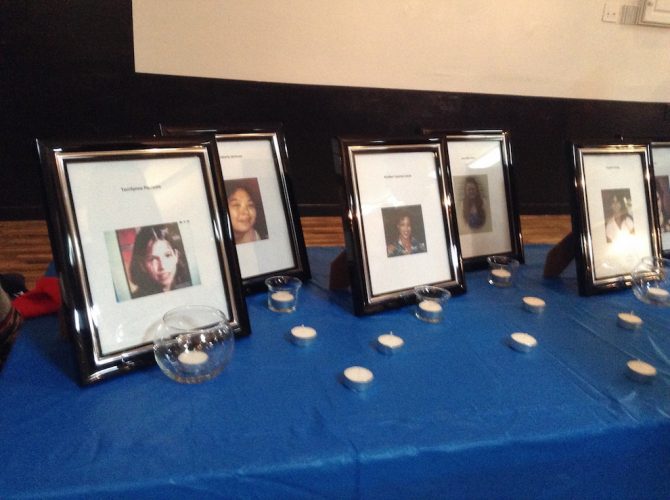MMIW
Community relations team for MMIW national inquiry beginning to form
Community liaison from Atlantic Canada among the positions being filled

caption
A display of pictures of missing and murdered indigenous men and women displayed at the Mi'kmaw Native Friendship Centre last October.
caption
Pictures of missing and murdered Indigenous men and women displayed at the Mi’kmaw Native Friendship Centre last October.After a rocky start, the staff for the national inquiry into missing and murdered Indigenous women (MMIW) is beginning to take shape, including a community liaison from Atlantic Canada.
Cheryl Maloney, president of the Nova Scotia Native Women’s Association, said the addition of liaisons were the most important aspect of the community relations team.
“They’re going to play the most important role in this inquiry,” she said. Related stories
Part of the community relations team, the community liaison’s work is to ensure that communication between the families, victims, advocates and inquiry staff doesn’t break down. There will be five overall.
About the inquiry
In 2015, the Truth and Reconciliation Commission of Canada released a summary report detailing 94 calls to action. It urged all levels of government to work together to advance the Canadian reconciliation process regarding residential schools.
One of these calls to action recommended that the federal government establish a public inquiry into the victimization of Indigenous women and girls.
Led by five commissioners, the $53.8-million, independent national inquiry officially launched last August.
We've spent about 10 % of our budget so far, begun to meet with families and organizations for guidance on planing hearings #MMIWG #FFADA
— InquiryEnquête (@MMIWG) March 3, 2017
Currently, six teams have been formed, as well as a number of assistants and advisers.
The community relations team is headed up by Waneek Horn-Miller — a Mohawk and former Olympian who was announced as its director at the inquiry’s first news conference on Feb. 7. The team also includes Tanya Kappo as manager and Alana Boileau as the community liaison officer.
Rounding out the team will be the five community liaisons, who will be appointed “as soon as possible,” Horn-Miller said on Friday.
“A lot of applications”
The deadline to apply to be a community liaison ended a few weeks ago, however Horn-Miller noted that there were “a lot of applications” from across Canada to look through. It’s unclear how many came from Atlantic Canada.
“We have to do this right, so that’s why it’s not happening overnight,” she said. “Really, it is encouraging. We realize that there’s a lot of people that want to support this inquiry and really appreciate it.”
For Maloney, community liaison interest from Indigenous communities across Canada served as a positive sign.
“These (the applicants) are the people, the organizations, the groups that have been supporting them (the families) all along,” she said.
Horn-Miller added the importance of addressing various demographics during the appointment process.
“Because these liaisons are really often the first line for many families and many organizations, they have to be known to the communities and they have to have sensitivities to those communities,” she said.
‘Reaching out’
While not every qualified applicant will be selected, they can be included in other aspects of the inquiry.
One example would be aiding the health team, which specializes in areas such as support, spiritual guidance and counselling for the affected families.
“A lot of these applications, perhaps, we could be reaching out to them in other ways when hearings come, for example,” Horn-Miller said.
“Some of them (the applicants) have expressed or have shown skills in other areas that perhaps our health team can utilize. So, we’re trying to include (that) and we appreciate all of the outreach and the people who have applied to us.”
Creating a protocol
In the meantime, Horn-Miller and her team are working on creating a protocol for different aspects of the inquiry.
“What I keep telling people is, with this inquiry, there’s no template in which we can go to and say, ‘Oh, it’s already been done before, this is how you do it,'” she said. “We’re really creating something from scratch, which is quite exciting, but challenging at the same time.”
As of March 3, applications for the inquiry’s communications director, health director, hearings co-ordinator and administrative assistant were still being accepted.
